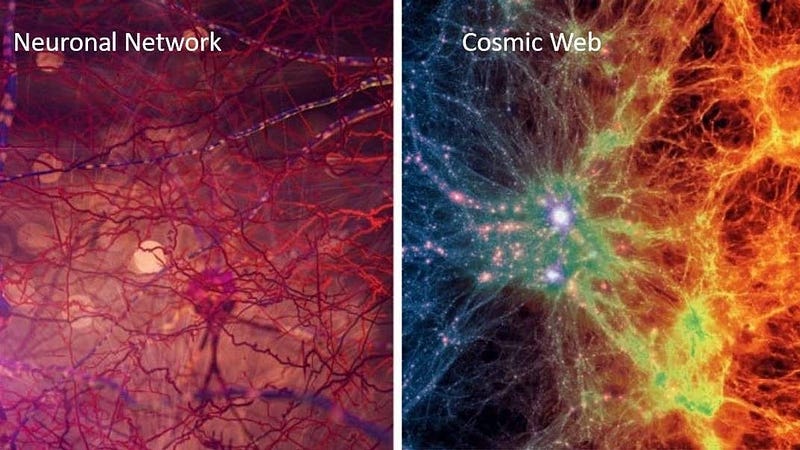The Universe: A Cosmic Brain Linked by Consciousness
Written on
Chapter 1: Understanding the Universe as a Neural Network
The concept of the universe as a colossal neural network is not as novel as some might think. Discussions around consciousness suggest that everything can be understood as data and awareness. When reading Tristan Greene's article, "Research indicates the whole universe could be a giant neural network," which delves into insights from Vitaly Vanchurin, a physics professor at the University of Minnesota Duluth, it's surprising to see the excitement around what seems like a well-trodden idea.

Section 1.1: The Galactic Neuromorphic Network
In one of Anton Petrov's episodes, he noted the parallels between the structures of the brain and the universe. While he might not have quoted it verbatim, he implied that "morphology does not necessarily denote function." Just because a structure resembles a brain doesn't mean it operates like one. Only a child might jump to that conclusion.
When we see these similarities, it sparks curiosity. Yet, if we were to speculate wildly, we might face criticism, while scientists do so under the guise of speculation. This reminds me of a conversation I had with a former partner. I dreamt aloud of taking a caravan to a national park, and she swiftly pointed out the financial impracticality.
Instead of responding defensively, I simply asked, "Have you noticed that when you daydream, I join in, but when I do, you dismiss it?" This question led to a mutual understanding, highlighting our distinct perspectives.
If we consider ourselves as nodes within a brain, as the article suggests, it reflects the nature of relationships. Each of us exists in our own worlds, interacting yet rarely aligned in a way that keeps us connected indefinitely.
We are undoubtedly entangled! This is how neurons operate—through entanglement. Interestingly, the notion of membranes can be interpreted as brains expressing memes. Memes, while seemingly fixed, can encapsulate vast concepts and potentially give rise to entire universes.
Section 1.2: The Collective Consciousness
The article "The Universe Organizes in a Galactic Neuromorphic Network" by William Brown reinforces the idea that this theme is far from new; it's an enduring meme! He introduces concepts like the Morphogenic Field, suggesting that all species are interconnected, and when a certain threshold is reached, collective access is granted. This notion resonates with Carl Jung's idea of the Collective Unconscious. Many spiritual teachings echo this sentiment, albeit in less scientific terms.
Entanglement reminds us that all particles are interconnected. As the universe evolves, so do we, with our growth inherently influencing the cosmos.
Persian poets articulated this interconnectedness long before figures like William Blake and Walt Whitman. Loren Eisley and other naturalists have emphasized this concept as well; to truly grasp the essence of "The Star Thrower," one must read Eisley’s original work.
What hinders humanity from embracing this idea? Is it the modern philosophy that promotes a sense of separation? It suggests an 'us versus them' mentality, ignoring that we are merely nodes in a vast network—no person is an island. As John Donne famously stated!
The term "spooky action at a distance" signifies that nothing exists in isolation. This notion of entanglement has become even more intriguing, as highlighted in the article "Spooky action at a distance" gets a lot spookier.
In this video, scientists discuss the unsettling implications of viewing the universe as a massive brain, exploring the interconnectedness of all things.
The second video investigates the theory that the universe may function similarly to a giant brain, examining the scientific perspective on this idea.
Ultimately, whether or not one identifies as a scientist, we all possess unique perspectives that contribute to a larger understanding of consciousness. Each of us embodies a blend of personalities and archetypes, a foundation of modern psychology that reflects broader sociological and physical principles.
We are all part of the whole! As we navigate this reality, let us practice compassion towards ourselves and others, for how we treat those around us—whether in waking life or dreams—reflects our relationship with the divine.